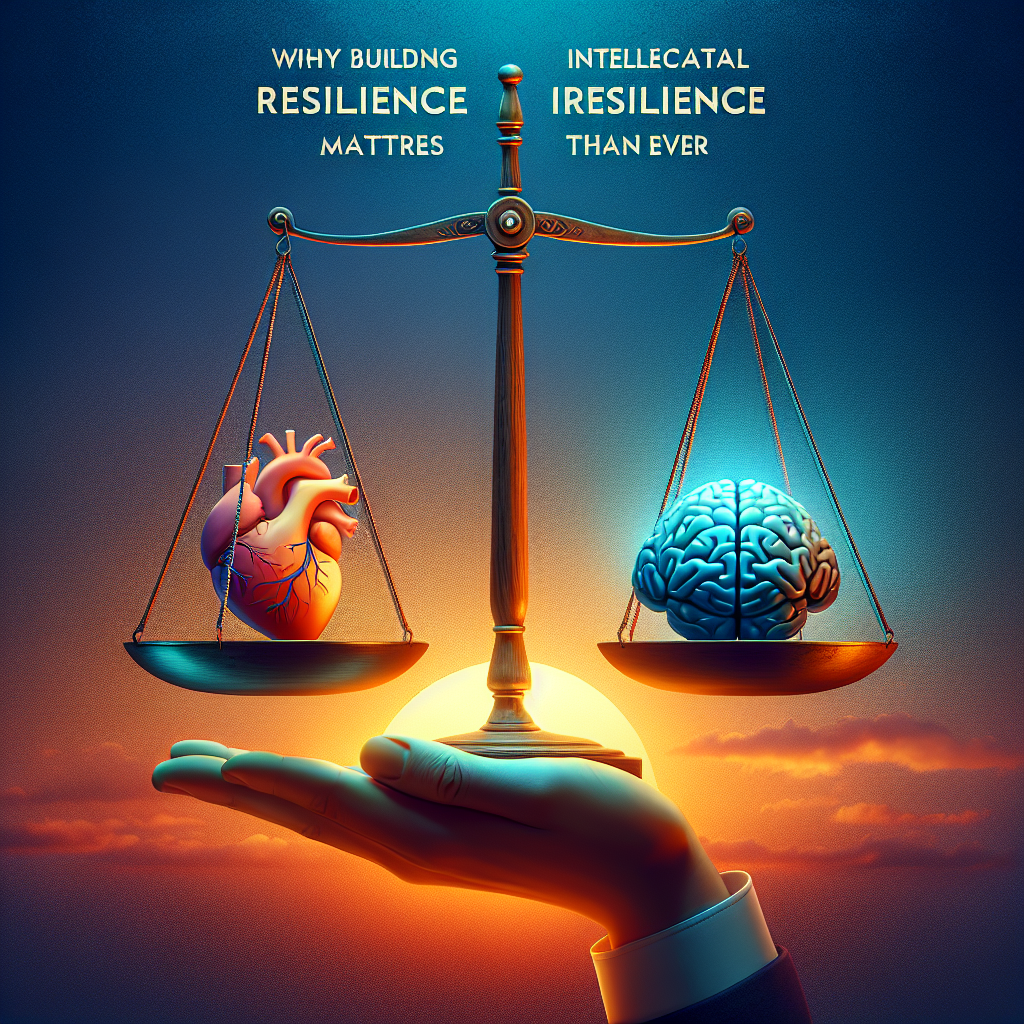Why Building Emotional Resilience Matters More Than Ever

Discover why building emotional resilience matters more than ever in today’s challenging times. Learn strategies to strengthen your emotional resilience and improve your overall well-being. Don’t wait, start your journey towards a more resilient you today. Click here to learn more.
The Importance of Emotional Resilience in Today’s Stressful World
In today’s fast-paced, high-stress world, the importance of emotional resilience cannot be overstated. Emotional resilience refers to one’s ability to adapt to stressful situations or crises. It’s the capacity to bounce back from difficult experiences, to cope with life’s ups and downs, and to keep going in the face of adversity. More than just a coping mechanism, emotional resilience is a key component of mental health and overall well-being.
In the face of the global pandemic, economic uncertainty, and social unrest, emotional resilience has become more important than ever. The world is changing at an unprecedented pace, and these changes often bring stress, anxiety, and uncertainty. In such a volatile environment, emotional resilience serves as a buffer against the negative effects of stress. It helps individuals navigate through these challenging times, enabling them to maintain their mental health and continue to function effectively.
Emotional resilience is not about avoiding stress or pretending that problems don’t exist. Rather, it’s about facing these challenges head-on, managing the emotions that come with them, and finding ways to move forward. It’s about maintaining a positive outlook, even when things seem bleak. It’s about learning from past experiences, and using those lessons to navigate future challenges.
Building emotional resilience is a process that requires time and effort. It involves developing a set of skills and strategies that can help manage stress and bounce back from adversity. These may include problem-solving skills, communication skills, and the ability to manage emotions. It also involves cultivating a positive mindset, fostering strong relationships, and maintaining a healthy lifestyle.
Research has shown that emotional resilience can be learned and developed. It’s not something that people either have or don’t have. Rather, it’s a skill that can be honed over time. This is encouraging news, as it means that everyone has the potential to become more emotionally resilient.
Building emotional resilience can have a profound impact on one’s life. It can improve mental health, enhance relationships, and boost job performance. It can also lead to greater satisfaction and happiness. In a world that is increasingly stressful and unpredictable, these benefits are more important than ever.
In conclusion, emotional resilience is a vital skill in today’s stressful world. It’s the ability to cope with adversity, to bounce back from difficulties, and to keep going in the face of challenges. It’s a skill that can be learned and developed, and one that can have a profound impact on one’s life. As the world continues to change at an unprecedented pace, building emotional resilience matters more than ever. It’s not just about surviving in a stressful world, but about thriving in it.
Why Building Emotional Resilience is Crucial in the Era of Uncertainty

In the era of uncertainty, building emotional resilience has become more crucial than ever. The world is changing at an unprecedented pace, and the challenges we face are increasingly complex. From the global pandemic to economic instability, political unrest, and climate change, we are living in a time of great uncertainty. This uncertainty can lead to stress, anxiety, and other mental health issues. However, by building emotional resilience, we can better navigate these challenges and maintain our mental well-being.
Emotional resilience refers to our ability to adapt to stressful situations or crises. It’s the capacity to bounce back from difficult experiences and maintain a positive outlook. It’s not about avoiding stress or hardship, but rather learning how to manage and respond to it effectively. Emotional resilience is not a trait that people either have or do not have. It involves behaviors, thoughts, and actions that can be learned and developed over time.
In the face of uncertainty, emotional resilience allows us to maintain balance in our lives despite the chaotic circumstances around us. It enables us to keep a clear mind, make rational decisions, and stay focused on our goals. When we are emotionally resilient, we are better equipped to handle the pressures of uncertainty and change. We can face challenges head-on, learn from our experiences, and grow stronger as a result.
Building emotional resilience is a proactive approach to mental health. It involves developing coping strategies and self-care practices that promote emotional well-being. This might include mindfulness exercises, physical activity, maintaining a healthy diet, getting enough sleep, and seeking support from friends, family, or a mental health professional. These practices can help us manage stress, reduce anxiety, and improve our overall mental health.
Moreover, emotional resilience can also enhance our relationships. When we are emotionally resilient, we are better able to communicate our feelings and needs, understand and empathize with others, and manage conflict effectively. This can lead to healthier and more fulfilling relationships, which in turn can provide a strong support network in times of stress and uncertainty.
In the workplace, emotional resilience is increasingly recognized as a critical skill. In a rapidly changing and uncertain business environment, employees who are emotionally resilient are more likely to adapt to change, overcome obstacles, and perform well under pressure. They are also more likely to exhibit leadership qualities, such as the ability to inspire and motivate others, and to maintain a positive and productive work environment.
In conclusion, building emotional resilience is crucial in the era of uncertainty. It equips us with the tools to navigate challenges, maintain our mental well-being, and thrive in the face of adversity. It’s a skill that can be developed and strengthened over time, and it’s one that can benefit every aspect of our lives. As we continue to navigate this uncertain world, let’s prioritize building our emotional resilience. It’s not just about surviving the challenges of today, but about thriving in the future, whatever it may hold.
Emotional Resilience: The Key to Surviving and Thriving in Modern Times
In the face of life’s inevitable challenges and adversities, emotional resilience has emerged as a critical attribute. It is the ability to adapt and bounce back when things don’t go as planned. Emotional resilience is not about avoiding stress or running from difficulties, but rather about embracing and effectively managing them. In our modern, fast-paced world, where stress and uncertainty are often the order of the day, building emotional resilience matters more than ever.
Emotional resilience is the psychological equivalent of having a well-stocked emergency kit. It equips us with the necessary tools to navigate through life’s storms and come out stronger on the other side. It is not a trait that people either have or do not have. It involves behaviors, thoughts, and actions that can be learned and developed by anyone.
The importance of emotional resilience in today’s world cannot be overstated. We live in an era characterized by rapid change, high expectations, and constant connectivity, which can lead to a heightened sense of stress and anxiety. The COVID-19 pandemic has further amplified these challenges, bringing unprecedented levels of uncertainty and disruption. In such times, emotional resilience serves as a buffer, helping us to maintain our mental health and well-being.
Moreover, emotional resilience is not just about surviving; it’s also about thriving. It enables us to learn from our experiences and grow. It fosters a positive outlook, encouraging us to see challenges as opportunities rather than threats. It promotes flexibility, allowing us to adjust our strategies when circumstances change. It cultivates a sense of control, empowering us to take charge of our lives rather than feeling victimized by circumstances.
Building emotional resilience is a process that requires time and effort. It involves developing a range of skills and strategies, such as maintaining a positive attitude, practicing self-care, building strong relationships, and seeking professional help when needed. It also involves cultivating a growth mindset, which views challenges as opportunities for learning and growth rather than as insurmountable obstacles.
One of the most effective ways to build emotional resilience is through mindfulness. Mindfulness involves paying attention to our thoughts and feelings without judging them. It encourages us to stay present and engaged, even when facing difficulties. By practicing mindfulness, we can learn to respond to stress in healthier ways, rather than reacting impulsively or avoiding it altogether.
Another key strategy is to build strong social connections. Research has shown that having supportive relationships can help buffer against stress and promote emotional well-being. This doesn’t necessarily mean having a large network of friends. Rather, it’s about having a few close relationships that provide emotional support, understanding, and encouragement.
In conclusion, emotional resilience is a vital skill in our modern world, where stress and uncertainty are often the norm. It equips us with the tools to navigate life’s challenges and come out stronger on the other side. It’s not just about surviving, but also about thriving, learning, and growing. By investing time and effort in building our emotional resilience, we can enhance our mental health, well-being, and overall quality of life.